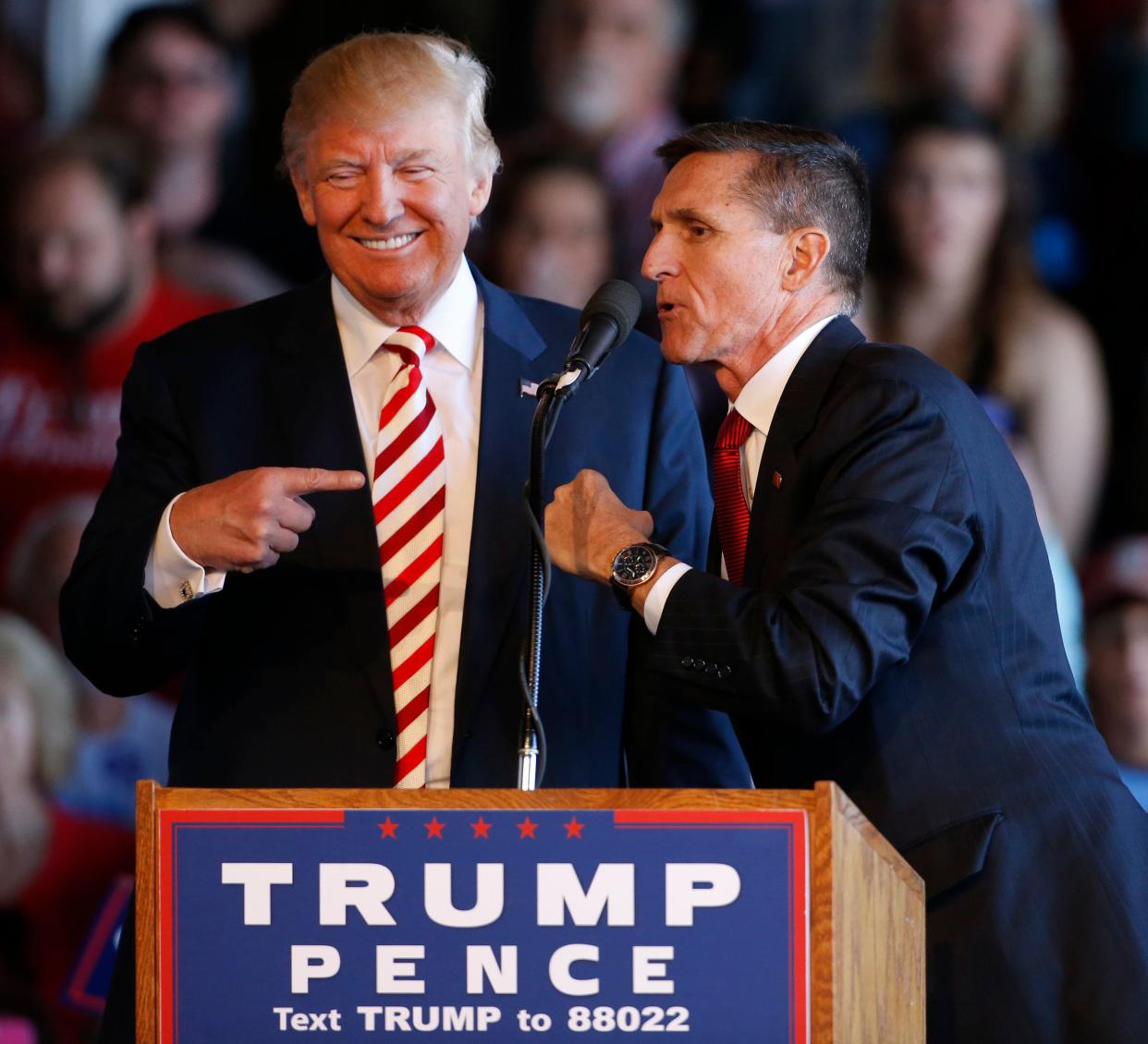Michael Flynn sentencing memo on Russia is a ticking time bomb for Team Trump

The sentencing memo released this week by special counsel Robert Mueller strongly suggests that Michael Flynn was taking orders from others when he called the Russian ambassador in December 2016 and asked that Russia not retaliate against new U.S. sanctions. The heavy redactions in an addendum to the memo hold the secret of whether President Donald Trump himself was in the loop.
Michael “Lock-Her-Up” Flynn, Trump's former national security adviser in the White House, pleaded guilty over a year ago to having lied to the FBI about phone calls he had in December 2016 with Sergey Kislyak, then the Russian ambassador to the U.S. Flynn and Kislyak talked on the phone about the additional sanctions that the Obama administration had imposed on Russia in the wake of a U.S. intelligence report concluding that Russia had interfered in the 2016 Presidential election.
Flynn and K.T. McFarland, who were two of Trump’s senior foreign policy advisers during this transition period, were either with Trump or in close touch with him while he was at his Mar-A-Lago resort in Palm Beach, Florida resort in late December, 2016, when these new sanctions were imposed by the Obama White House. Many State Department employees and CIA analysts stationed at the U.S. Embassy in Moscow braced for the inevitable “tit-for-tat” retaliation that inevitably follows whenever the U.S. orders Russian diplomats and known spies to leave the U.S. The U.S. Embassy in Moscow expected a huge Russian-ordered exodus to take place immediately following the December 2017 sanctions on Russia.
Flynn's back-door diplomacy was out of line
Worried that the Obama “get tough with Russia” policy would tie Trump’s hands once he took over the reins of power, Flynn and McFarland recommended that Trump immediately send a “back-door” signal to the Russians to hold off with any retaliation plans until after Trump had moved into the White House and given the opportunity to lift the Russian sanctions that were crippling the Russian economy.
Flynn then had a flurry of calls and texts with Kislyak on Dec. 29, 2016. Flynn must have known at the time that he was violating the Logan Act, the longstanding U.S. law prohibiting private citizens from interfering with U.S. foreign policy. This is probably one of the reasons he later lied about these calls when confronted by FBI agents.
You might also like:
Gen. Flynn is making amends. That's good for America and the Mueller investigation.
Schiff: Trump is compromised. What else is he hiding and who else knows about it?
What Michael Flynn's memo means: Today's talker
Given the significance of the contacts Kislyak, it seemed virtually inconceivable to the FBI and the special counsel’s office that Flynn would have made such a consequential phone call to the Russians on his own, without checking with “the boss,” Donald J. Trump. The phone calls themselves between Flynn and Kislyak had been intercepted. They knew Trump and McFarland were together at Mar-A-Lago when Flynn was engaging in his intensive telephone diplomacy with the Russians.
They also knew that Flynn and McFarland were in close and near-constant contact by telephone both before and after Flynn’s calls with Kislyak, and that Putin and his Kremlin cronies made the surprising decision on Dec. 30 — within 24 hours of Flynn's contacts — to defer any response to these new Obama sanctions until after Trump took office.
Also significantly, U.S. law enforcement knew that Trump had delayed firing Flynn for at least several weeks after then Acting Attorney General Sally Yates told the Trump White House that Flynn, now the national security adviser, was in danger of being compromised by the Russians since they knew that Flynn was lying to Vice President Mike Pence and everyone else who asked him (including the FBI) about his contacts with the Russians.
Flynn's cooperation can fill in the gaps
What the FBI and federal prosecutors didn’t have was proof that Flynn had gotten clearance from Trump before he made the call, and that he reported the results of the phone call to Trump immediately following that call. They may have it now that Flynn took a guilty plea and started cooperating.
There is undoubtedly other significant information that Flynn provided the federal prosecutors during the 19 interview sessions that they had with him, and the recommendation of a lenient sentence that does not include any jail time is based upon the totality of that information and circumstances surrounding Flynn’s cooperation. But far and away the most significant nugget of information from Flynn relates to what Trump knew and when he knew it regarding the “back door” diplomacy that Flynn engaged in with the Russians when both Flynn and Trump were still private citizens.
The Trump Team can publicly deny the significance of Flynn’s cooperation all they want, but privately they know that the redacted portions of the Flynn sentencing memo are ticking time bombs that will get to the truth once and for all.
Kenneth F. McCallion is a former federal prosecutor with the Department of Justice and senior partner in the law firm of McCallion & Associates. He is also an adjunct professor at Cardozo Law School in New York, and the author of "The Essential Guide to Donald Trump."
You can read diverse opinions from our Board of Contributors and other writers on the Opinion front page, on Twitter @usatodayopinion and in our daily Opinion newsletter. To respond to a column, submit a comment to letters@usatoday.com.
This article originally appeared on USA TODAY: Michael Flynn sentencing memo on Russia is a ticking time bomb for Team Trump

